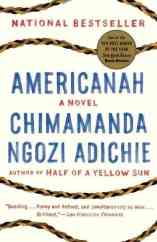Tags
 “You are the absolute love of my life,” he’d written in her last birthday card—and yet there was cement in her soul. It had been there for a while, an early morning disease of fatigue, a bleakness and borderlessness. It brought with it amorphous longings, shapeless desires, brief imaginary glints of other lives she could be living, that over the months melded into a piercing homesickness. (7)
“You are the absolute love of my life,” he’d written in her last birthday card—and yet there was cement in her soul. It had been there for a while, an early morning disease of fatigue, a bleakness and borderlessness. It brought with it amorphous longings, shapeless desires, brief imaginary glints of other lives she could be living, that over the months melded into a piercing homesickness. (7)
Ifemelu opened her novel, Jean Toomer’s Cane, and skimmed a few pages. She had been meaning to read it for a while now, and imagined she would like it since Blaine did not. A precious performance, Blaine had called it, in that gently forbearing tone he used when they talked about novels, as though he was sure that she, with a little more time and a little more wisdom, would come to accept that the novels he liked were superior, novels written by young and youngish men and packed with things, a fascinating, confounding accumulation of brands and music and comic books and icons, with emotions skimmed over, and each sentence stylishly aware of its own stylishness. She had read many of them, because he recommended them, but they were like cotton candy that so easily evaporated from her tongue’s memory (14)
She ended every sentence she spoke to his uncles with “sir.” She put ribbons in the hair of his cousins’ daughters. There was something immodest about her modesty: it announced itself. (34)
He had scolded Ifemelu as a child for being recalcitrant, mutinous, intransigent, words that made her little actions seem epic and almost prideworthy. (58)
She wished, fleetingly, that her mother was not her mother, and for this she felt not guilt and sadness but a single emotion, a blend of guilt and sadness (63)
With him, she was at ease; her skin felt as though it was her right size. She told him how she very much wanted God to exist but feared He did not, how she worried that she should know what she wanted to do with her life but did not even know what she wanted to study at university. It seemed so natural, to talk to him about odd things. She had never done that before. The trust, so sudden and yet so complete, and the intimacy, frightened her. (73)
(…) she had begun, finally, to grasp the power books had over him. His longing for Ibadan because of “Ibadan” had puzzled her; how could a string of words make a person ache for a place he did not know? But in those weeks when she discovered the rows and rows of books with their leathery smell and their promise of pleasures unknown, when she sat, knees tucked underneath her, on an armchair in the lower level or at a table upstairs with the fluorescent light reflecting off the book’s pages, she finally understood. (166)
Ifemelu watched them, so alike in their looks, and both unhappy people. But Kimberly’s unhappiness was inward, unacknowledged, shielded by her desire for things to be as they should, and also by hope: she believed in other people’s happiness because it meant that she, too, might one day have it. Laura’s unhappiness was different, spiky, she wished that everyone around her were unhappy because she had convinced herself that she would always be. (203)
On an unremarkable day in early spring—the day was not bronzed with special light, nothing of any significance happened, and it was perhaps merely that time, as it often does, had transfigured her doubts—she looked in the mirror, sank her fingers into her hair, dense and spongy and glorious, and could not imagine it any other way. That simply, she fell in love with her hair. (264)
In describing black women you admire, always use the word “STRONG” because that is what black women are supposed to be in America. If you are a woman, please do not speak your mind as you are used to doing in your country. Because in America, strong-minded black women are SCARY. And if you are a man, be hyper-mellow, never get too excited, or somebody will worry that you’re about to pull a gun. When you watch television and hear that a “racist slur” was used, you must immediately become offended. Even though you are thinking “But why won’t they tell me exactly what was said?” Even though you would like to be able to decide for yourself how offended to be, or whether to be offended at all, you must nevertheless be very offended. (274)
OBS: não sei a razão, mas durante a outra metade do livro eu não marquei mais nenhuma citação; acho que nada mais me chamou especialmente a atenção, ou fiquei um pouco desatenta. Mas, acreditem, o livro TODO é ótimo. 🙂
Americanah Chimamanda Ngozi Adichie Anchor Books, 2003
